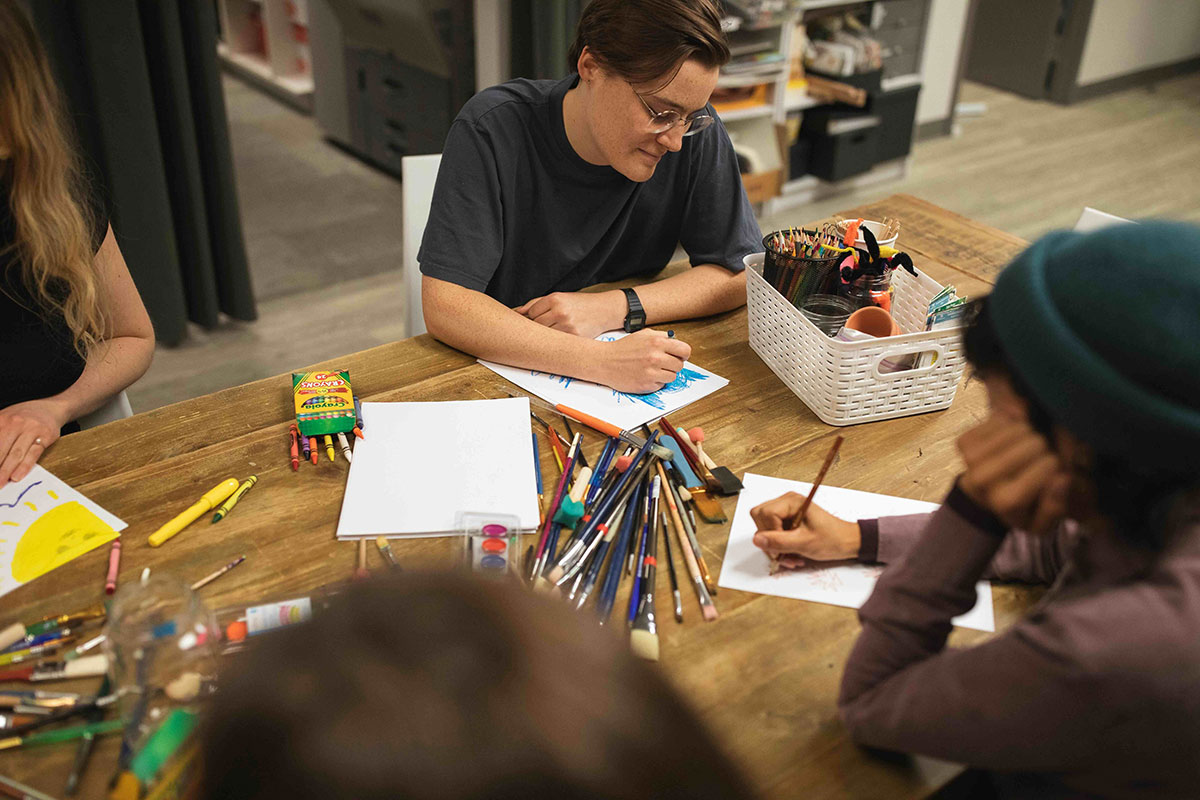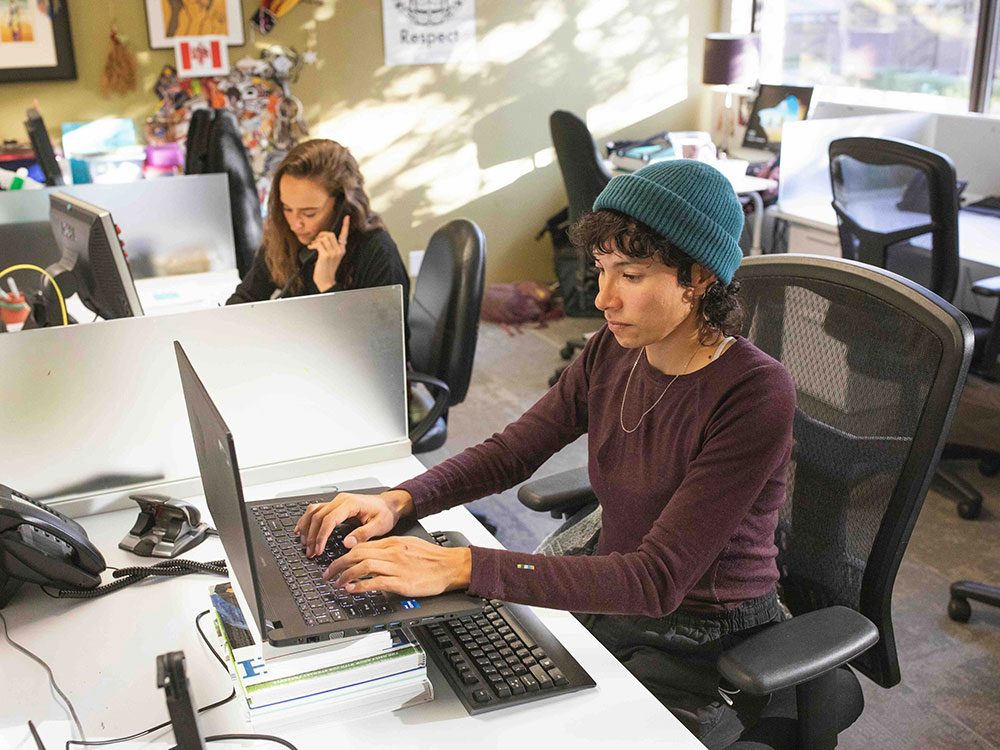A first-of-its-kind sexual assault support centre will soon be offering free-of-charge services to survivors of sexualized violence in Vancouver.
Set to open this month, the downtown space is operated by Salal Sexual Violence Support Centre, which supports more than 10,000 survivors of sexualized violence annually. Previously known as the WAVAW Rape Crisis Centre, Salal caters its services to those with shared experiences of gender marginalization, including cis and trans women, Two-Spirit, trans and non-binary people. To maintain the safety of survivors and staff, the specific location of the centre will remain confidential to the public.
Over the past five years, the need for specialized support for survivors of sexualized violence has steadily increased. Research shows one in three women experience sexualized violence at least once in their life, and Indigenous people, disabled people, and trans and gender-diverse people are at higher risk. According to statistics from the Vancouver Police Department, sexual assaults in 2023 have risen by 9.6 per cent compared with the previous year.
CJ Rowe, the director of the Simon Fraser University Sexual Violence Support and Prevention Office, says they have seen a notable uptake in services since the COVID-19 pandemic, and interactions have been slowly climbing since. Survivors face many barriers when seeking support including stigma, victim blaming and shame, Rowe explained.
“All of those pressures are often heightened for individuals who are racialized, have diverse gender identities [and] presentations, are of different socio-economic placements [and] lower income,” Rowe said.
“I also think that there are structural barriers inherent in some of the formal settings where individuals seek support. There’s a lot within our medical care system that’s not friendly for survivors, especially those whose first language isn’t English.”
By survivors, for survivors
Salal offers a range of in-person and virtual support services, including a 24-hour crisis and information line, hospital and court accompaniment, counselling and more. Designed by survivors for survivors, the centre is an opportunity to deepen the organization’s ongoing efforts to end sexualized violence in a space that facilitates healing, connection and safety. This space is one of five sexual assault centres across the province receiving restored funding from the B.C. government to provide trauma-informed, wraparound services to fill this critical need.
According to Salal’s executive director, Dalya Israel, having a space like this is especially important as non-profits are often told to make do with what they have, and aren’t always able to offer spaces tailored to survivors’ needs. Israel has worked full time with Salal since 2005 and has seen the organization through two other office spaces. One had bars on the windows. Another, she said, lacked sufficient space, noting some survivors found the elevated acoustics and overhead lighting of that space discomforting.
Informed by feedback from staff who are predominantly survivors themselves and their broader community, the new centre was designed with several trauma-informed considerations in mind.
“We were [previously] given this scarcity mindset where you should just be happy to be able to provide these services,” she said.
“So when we started to design the new space, our main notes to the design team were to have trauma-informed design and definitely to maximize the amount of space that was going to be used for survivors as opposed to for staff.”
Designing for safety and ease
Laura Looijen is an interior designer who worked with Salal’s team to make the space inviting for the unique needs of survivors of sexual violence. For Looijen, this meant incorporating features that steered away from the feel of sterile, medical environments that some survivors of sexualized violence may associate with traumatic experiences.
Trauma-informed design “comes down to creating safety and comfort within a space. There’s a certain colour palette we use with colours that are really grounding,” she said. “We wanted to create a space where survivors feel at ease without worry about where they’re going next, because there can be a lot more fear involved with that.”
Additional features in the space include a pre- and post-counselling session meditation room, indirect “cove” lighting to support emotional regulation, and private rooms for making incident reports to the police. There is also a multi-purpose community room for workshops, community training and Indigenous ceremonies.

Diffusing power imbalances
Rowe says sexual violence occurs on a spectrum, ranging from physical assaults to sexualized jokes and verbal harassment. In all forms, sexual violence is inherently about power, and rooms that support survivors to report their experiences are especially key in levelling the playing field.
“That section where they’ve created those rooms located in the Salal space is empowering. It helps to diffuse those power imbalances in place,” they explained. “To be able to have those harder conversations [with authorities] but then walk into a space that is set up for care and consent is really going to help cushion some of these harder edges of the work we do.”
The space also features versatile rooms for support, facilitating community connection and joy. Sexual violence is a systemic issue, says Israel, and in order to effectively analyze it in all its forms, creating spaces for joy is a part of Salal’s mission.
“Our mission is not just about Band-Aiding people up and then throwing them back out into the world that’s harmed them,” she said. “It’s also about stopping the flow, changing the conditions and not allowing the harm to happen.”
Like many other non-profits, Salal is launching the sexual assault support centre in a challenging economic landscape. The organization has launched a comprehensive campaign to not only support fundraising efforts but also create stability for the organization.
Investing in their efforts, Israel says, can take many forms. “We want to be available and that means having a whole community behind us,” she said. According to her, supporting the work of the sexual assault support centre can look like becoming involved in local events that aim to end sexualized violence, volunteering time to support the organization or becoming a donor to allow the organization to continue to support community needs.
Connecting with the wider community that supports survivors of sexualized violence is part of what sustains Israel. They remind her of what she and her peers are working to realize every day in their work: a future where people are living free of sexualized violence.
“Joy and celebrating our humanity and aliveness is so important, because if we just focus on trauma all the time, we’ll never know when we’re moving closer to liberation or ending rape culture, right?” she said. “We still have to be focusing on the things that we dream about the world becoming.” ![]()
Read more: Health, Rights + Justice, Gender + Sexuality

















Tyee Commenting Guidelines
Comments that violate guidelines risk being deleted, and violations may result in a temporary or permanent user ban. Maintain the spirit of good conversation to stay in the discussion and be patient with moderators. Comments are reviewed regularly but not in real time.
Do:
Do not: